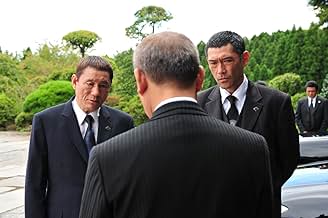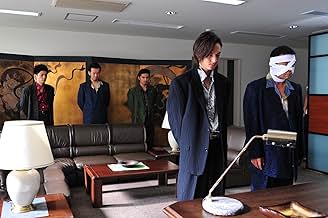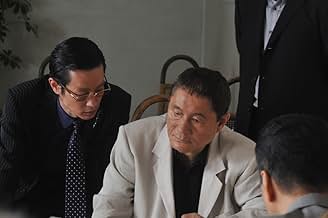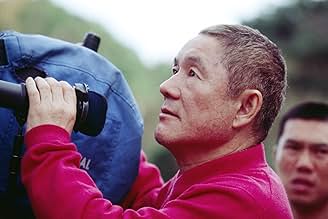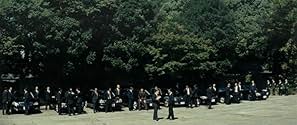Un'allenza interna alle famiglie della yakuza scatena una serie di omicidi a catena fomentati dal desiderio di fare carriera dei boss più piccoli. I cambiamenti saranno più radicali del prev... Leggi tuttoUn'allenza interna alle famiglie della yakuza scatena una serie di omicidi a catena fomentati dal desiderio di fare carriera dei boss più piccoli. I cambiamenti saranno più radicali del previsto.Un'allenza interna alle famiglie della yakuza scatena una serie di omicidi a catena fomentati dal desiderio di fare carriera dei boss più piccoli. I cambiamenti saranno più radicali del previsto.
- Regia
- Sceneggiatura
- Star
- Premi
- 1 candidatura in totale
- Ôtomo
- (as Beat Takeshi)
Recensioni in evidenza
Takeshi Kitano's return to his familiar stamping ground, the Yakuza, their intrigues, vendettas and highly inventive ways of inflicting extreme unpleasantness on one another, was given less than a stellar welcome by critics at the Festival. A common refrain was that there was nothing new on offer here, no new insights, just a retread of the familiar. Well, they are right, but is that really such a bad thing?
I say no, not when we get tough guys, sharp suits, black humour, extreme violence (you might never want to visit the dentist again), a convoluted plot that is hard to follow but has something to do with rivalry, inheriting the reins of power and inflicting extreme violence on the other team. Oh yes, there's also betrayal and extreme violence.
Outrage is old-school Takeshi Kitano, a (for me) welcome return to his glory days, not that he ever left them behind (I've time for all his films, if not his gameshows). If you like the man, as actor or director, then you won't be disappointed by this film, just as long as you are not expecting something new and different, that is.
Throughout the entire movie, I kept feeling a sense of lack. This lack was a lack of sympathy you feel for these characters, and the lack of understanding for the system on display. You don't understand what's going on until about an hour into the movie, and by then it's a little too late to care. There's a little too much shooting first, and too few questions asked. I believe Kitano really tried to write a movie that could stand among classics like Scarface and the Godfather in terms of epics, but fell short.
However, I would say the movie is worth a watch, if only to see what the movie could've been.
There are random acts of extreme violence that continue to propel the plot forward. Kitano, playing the underboss Otomo, is a similar role to his other characters in yakuza movies which portray out of control individuals that have a minor standing yet have the last word at the end of the play. Rather than focusing on the beauty of mobsters hiding out on the beach, this is a gritty, urban drama much in the tradition of Johnnie To's triad movies (Election) that has dominated the organized crime dramas over the past decade.
In showing the criminality of the human mind, it evokes Mario Bava's study in Rabid Dogs, similarly Kitano is building a Brechtian inspired drama about the harsh existential life. Kitano continues to explain and further define his worldview through the character of a doomed nihilist anti-hero. In all of Kitano's yakuza character studies, there is no hope, or redemption, only a further plunge into an ugly existence of lies and deceit, where only an act of violence can bring about change.
As Kitano remarked publicly about his making of Outrage, he is giving the people what they want - no pretense of artistic embellishments, but rather blunt, cruel acts of violence of the professional criminal devoid of any romanticism. One scene in particular evokes The Godfather, but that is where the similarities end - there is nothing glamorous about the yakuza lifestyle.
In this film, Kitano assumes the duties as in his other yakuza films as that of star, director, editor and writer. The vision is completely his own. The pacing is deliberately slow, showing that the life of a criminal is not particularly exciting but rather mundane as that of any other type of businessman, mostly involving allegiances of convenience and acts of betrayal. There is no illumination or redemption here, no course of action will lead to a better life, such is the basic tenet of a nihilist.
There is little flourish in the direction such as to immerse the viewer into the dark, banal existence of its characters. The one scene that brings a sense of relief with sunlight streaming through the trees on a backstreet, is colored darkly by seemingly innocent activity that is actually quite sinister for the individuals involved.
This is a welcome and long overdue return for Kitano to the yakuza genre which he abandoned a decade ago for a trilogy of felliniesque introspective autobiographical films. There are no experimental sequences or absurdist imagery as in his previous films. As a consequence, Kitano is no longer held back with meditative musings, instead giving the viewer an unfiltered take on the corruption, lies, and phony existence of the individual in an artificial society - that any person in any social situation is merely part of an inauthentic social contract.
In many ways, the lack of artistic pretense in Outrage only serves to further embolden the bleak message that Kitano has for us. This is not a film for the weak of heart, nor is it one for the impatient, it is a slow revelation revealing the emptiness of life and the pointlessness of all action.
Typically, the topic of yakuza is often shunned. If ever confronted, it is often used to accentuate comedic elements, whilst leaving the truth of the yakuza world unchallenged. However, director/screenwriter/actor Takeshi Kitano goes against the flow and makes a comeback with this feature film after almost a decade long hiatus. Though this is not as well received as compared to other made in Japan films, it has still received much acclamation. Earlier in his directing career, he was already known for "Violent Cop" and "Sonatine", which also dealt with the dark world of yakuza. It is therefore admirable for his efforts to bring forth the most truthful reflection of the dark side of Japan despite the risk of low commercial success. And for this film, he has once again managed to project a somewhat accurate image of the realities in the yakuza scene.
The overarching plot of the film works with the conflicts that could possibly exist in any relationships – malice and greed. It circles the power struggle between the Iketomo-gumi and its affliation Murase-gumi and his sworn brother Otomo (Takeshi Kitano) who has his own crew as well. While Otomo tries to break free from the subordination of the Murase-gumi, they too try to acquire greater power. In this power struggle, they begin to plot against one another and result in sheer violence and torture. In this aspect, Takeshi is quite creative and playful as he invents numerous ways that the characters get tortured or die. As revealed in one of his interviews, he actually came up with these before he wrote the narrative that parallels with the violence. The convincing gore and never-imagined ways to kill and torture; for this you really have to watch it for yourself.
Takeshi has carefully chosen who to cast for this film. He made a point not to repeat any actors who worked with him in his previous yakuza related works. The cast is pretty commendable for they capture the essence of the characters they are portraying, and even are said to get through each scene with only one or two shots. One of the more outstanding actors is undeniably Ryo Kase, who sports fluent English as opposed to the Japrish/Engrish we often associate Japanese with. That being said, the English dialogues between him and the gaijin (foreigner) were rather blunt and funny. This is probably intentionally designed to poke fun and entertain the viewers.
In the technical aspect, Takeshi displays much competence in his camera- work. From wide-angled shots, to close-ups, to long pans and even point- of-view shots; he utilized a variety of these shots to effectively communicate the non-verbal messages. Put simply, you will find it easier to 'get into the mood' as he engages the viewers very much. Also, hallmark of his films is the seemingly abrupt cuts that often do not signal direct causality in the sequences. As the idiom goes, "one man's meat is another man's poison". You will either hate this style or love this style. Though it can get confusing at times, the overarching plot sets a frame for which the sequences happen. Therefore in its fairly organized manner, it sparks brilliance in its narrative.
Overall the film though unconventional, is a careful examination of the selfish desires that deteriorates relationships. Fitted into the yakuza context, this message has an added punch. On a random note, do look forward to the unanticipated twist towards the end!
- www.moviexclusive.com
The great Japanese director Beat Takeshi returns to the big screen with ¨Outrage¨ dealing with a genre that gave him international recognition and made him one of the best Asian filmmakers , and being Takeshi Kitano's first gangster film in ten years , after Brother (2000) . It is an exciting picture displaying suspense , tension , and interesting gangsters war , though sometimes difficult to follow . There is also a cruel depiction of Yakuza life in the 21st century . The story opens with a striking wide shot of a large group of gangsters dressed in black as their leaders meet , these guys have sworn allegiance to their bosses, but it means little once the bullets start flying . Cold and violent film with a confuse plot , twisted intrigue , grisly killings , thrills , chilling events and colorful images . His stunning long takes can resemble intricate paintings while his characters enjoy little respite from the ruthlessness of the real world . However , it results to be a little bit boring , including with no sense dialogs and some embarrassing situations adding brutal murders . Following a string of unconventional , commercially unappealing films, Takeshi Kitano engineered this film specifically as commercially appealing, going back to the genre which brought him the most success, and going as far as imagining the death scenes first and writing a story around them later .
The motion picture was professionally directed by Takeshi Kitano in his peculiar style , being his first film shot in 2.35:1 format . Since his 1989 directorial debut, Kitano has written, directed, edited or starred in almost a film per year without losing the momentum of his originality and heightened artistic sensibility. The extraordinary success of 1997's Hana Bi confirmed Kitano's place as a leading figure of international cinema , here offered remarkable visions of violence and beauty . Among its numerous awards, "Hana-bi" or ¨Fireworks¨ won Venice Film Festival's Golden Lion and was named Best Non-European Film by the European Film Academy . In 2000 Kitano made Brother (2000), his first film shot outside of Japan. Originally a comedy star on Japanese television, Takeshi Kitano , aka Beat Takeshi , rose to international fame as a director of Yakuza dramas during the 1990s . "Brother", like other Kitano-directed films such as his debut "Violent Cop" , ¨Boiling Point¨ (1990) and ¨Sonatine¨ (1993), centered around Yakuza (gangster) characters. The filmmaker contrasted the violence and action of those films with comedy or tenderness in films like Ano Natsu, Ichiban Shizukana Umi (1991) (US title: "A Scene at the Sea"), Minnâ-Yatteruka! (1994) (US title: "Getting Any?"), Kizzu ritân (1996) (US title: "Kids Return") and Kikujiro (1999). For the first time in six years, Kitano remained strictly behind the camera on Dolls (2002), his tenth film as a writer-director . His last film is this ¨Outrage¨ that most closely resembles 2000's Brother in tone, but it outdoes that picture by remaining unpredictable with constant betrayals , getting a considerable success .
Lo sapevi?
- QuizFollowing a string of unconventional, commercially unappealing films, Takeshi Kitano engineered this film specifically as commercially appealing, going back to the genre which brought him the most success, and going as far as imagining the death scenes first and writing a story around them later.
- Citazioni
Ikemoto: H-h-hold on a minute...
[panting]
Ikemoto: I'll reverse the banishment.
Ôtomo: Huh?
Ikemoto: I'll reverse the banishment.
Ôtomo: You banish me, then you reverse it?
[explodes]
Ôtomo: How many fucking tongues do you have?
Ikemoto: Huh?
Ôtomo: Are you deaf? How many do you have?
Ikemoto: I've only got one.
Ôtomo: Only one? *Two* or *three* is more like it, you fucking prick!
Ikemoto: I'm telling you I've only got one tongue!
Ôtomo: [a little calmer] Open your mouth.
[louder]
Ôtomo: Stick out your tongue!
Ikemoto: [beat] Huh?
Ôtomo: [barking] Stick out your tongue!
[Ikemoto reveals reluctantly a bit of his tongue]
Ôtomo: MORE!
[Ikemoto does]
Ôtomo: STICK IT OUT, YOU MOTHERFUCKER!
[Ikemoto sticks out his entire tongue, then Otomo slams his jaw so violently that Ikemoto bites through his own tongue; Otomo then shoots him]
- ConnessioniFeatured in Ebert Presents: At the Movies: Episodio #2.18 (2011)
I più visti
- How long is Outrage?Powered by Alexa
Dettagli
- Data di uscita
- Paese di origine
- Siti ufficiali
- Lingue
- Celebre anche come
- The Outrage
- Luoghi delle riprese
- Chuo-ku, Tokyo, Giappone(Exterior)
- Aziende produttrici
- Vedi altri crediti dell’azienda su IMDbPro
Botteghino
- Lordo Stati Uniti e Canada
- 44.745 USD
- Fine settimana di apertura Stati Uniti e Canada
- 6518 USD
- 4 dic 2011
- Lordo in tutto il mondo
- 8.457.741 USD
- Tempo di esecuzione1 ora 49 minuti
- Colore
- Mix di suoni
- Proporzioni
- 2.35 : 1
Contribuisci a questa pagina





